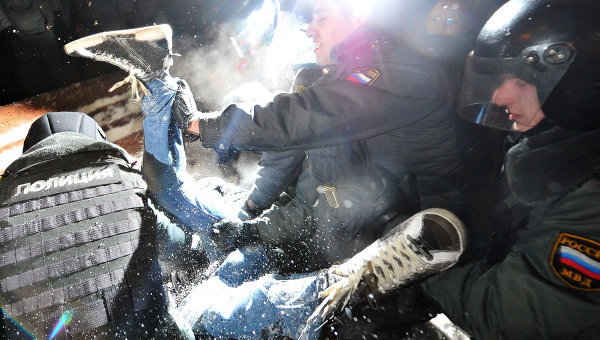
The Election Season Is Over in Russia and the Time for Repression Has Come
Publication: Eurasia Daily Monitor Volume: 9 Issue: 48
By:

On March 4, Vladimir Putin won a crushing electoral victory and ensured a third six-year term in the Kremlin as Russia’s president. The Central Election Commission (CEC) published the final official results: Putin received 63.6 percent of the popular vote. The Communist leader, Gennadiy Zyuganov, came in a distant second, with 17.18 percent; tycoon Mikhail Prokhorov with 7.98, flamboyant nationalist demagogue, Vladimir Zhirinovsky, with 6.22; and Just Russia leader Sergey Mironov (a long time close political associate of Putin from St. Petersburg) with 3.85. Some 71.78 million Russians voted in the election (Interfax, March 7). The CEC refused to register Liberal Yabloko party leader Grigoriy Yavlinsky. The unexpectedly high vote for Prokhorov, a billionaire without any political experience or background, seems to have been largely a protest vote against Putin in the absence of any other alternative. After the election, Zhirinovskiy and Mironov accepted defeat and congratulated Putin. Zyuganov declared the election “unfair, unjust and illegitimate” (Interfax, March 5).
International observers and the independent Voters League say the elections were unfair and unjust, marred with fraud and violations (Interfax, March 7). But Putin’s Russia is an authoritarian dictatorship ruled by a corrupt bureaucracy: all TV channels are controlled and viciously censured. The courts rule as Putin orders, the CEC is openly biased. The CEC chairman, Vladimir Churov, among other things accused Western election observers of being spies, who are using the presidential election as a pretext to peer into Russian military secrets (Interfax, March 5). In Putin’s Russia, ruled by a paranoid dictator, “free and fair elections” are impossible, as in Belarus or in Central Asian dictatorships (Turkmenistan, Uzbekistan and others).
Many political observers in Moscow believe Putin’s apparent landslide victory has demonstrated the ineptitude of the prodemocracy movement “for just elections” that had organized several mass anti-Putin demonstrations in Moscow in recent months after the fraudulent December 4, 2011 Duma elections and public protests will soon run out of steam. The next Duma elections are planned in December 2016 and presidential – in March 2018 (Nezavisimaya Gazeta, March 7).
Putin has announced that he will fulfill his public promise and employ the outgoing president Dmitry Medvedev as prime minister. Putin added, “We will begin jointly to put together a list of a new cabinet.” Putin’s inauguration is planed for the beginning of next May. Putin announced that he could encourage Yavlinsky to cooperate with his administration and offer Prokhorov a place in government “if he wishes” (https://premier.gov.ru/events/news/18379/). Co-opting Yavlinsky and Prokhorov could allow Putin to split the opposition and isolate its more radical part, further widening his powerbase. Promises of reforms, of slackening the restrictions on registering parties and restoring the elections of regional governors are additional means to pacify the opposition. Of course, the co-opting of some opposition figure or regional elections will not detract Putin’s real dictatorial powers even an inch.
The diehard opposition will face increasingly severe repression. On Monday, March 5, the next day after the election, riot police illegally attacked, arrested and beat up peaceful protesters and journalists in the center of Moscow and in St. Petersburg in an intimidating display of force. Over 500 were arrested in the two cities. Putin personally thanked the riot police and blamed the protesters for causing the trouble (Interfax, March 7).
Putin seems to be fully in control; the diverse opposition is splintered, without a clear strategy or agenda, only a strong desire to somehow topple the hated corrupt regime. The situation seems as discouraging in Russia today, as in the Belarus realm of life-long president Alexander Lukashenka, but there is one glimmer of hope: the results of the presidential vote in Moscow – the only region of Russia in which Putin got less than 50 percent of the popular vote.
In Moscow, according to the official final results, Putin got 46.95 percent of the vote, Prokhorov – 20.45; Zyuganov – 19.18; Zhirinovsky – 6.3 and Mironov – 5.05 (Interfax, March 5). In the coming months Putin’s support in Moscow will further dwindle, as inevitable unpopular measures, postponed until after the election, go into force: price hikes on utilities and public transport, severe restrictions on accessibility and multiple price increases of tobacco and alcohol, including vodka and beer. Previously restricted petrol prices will grow and inflation will increase, caused by the overall growth of tariffs and taxes. The prodemocracy movement “For Just Elections,” led by the more educated middle class in Moscow, may be boosted by growing discontent of poorer social groups. In any nation after an election, the popularity of a winning party tends to decrease as reality does not live up to expectations. In Russia, according to the director of the independent sociological service Levada Center, Lev Gudkov, 35 percent of the overall population does not recognize Putin’s reelection as legitimate. In Moscow this percentage may be higher, and in the fall of 2012 “the protests may grow” (Novyye Izvestia, March 6).
There are no pending national elections (fraudulent or just) in Russia anytime soon, so its political future will not be decided at the ballot box, but on the streets of Moscow. In an authoritarian highly centralized dictatorship like Russia, the capital and its inhabitants are in most cases the decisive factor, while the rest of the nation passively looks on. Now it is an established fact – Moscow is Putin’s weakest point. Moscow, a city of officially 12 million residents and additional millions of suburban commuters and unofficial inhabitants, will be a nightmare to control if over 50 percent are discontented and at least 5 percent are actively protesting.
On March 5, dealing with several thousand passively protesting demonstrators, the riot police in Moscow struggled to fully control all of the downtown streets, even though it was reported that the Moscow riot police (some 2,000 strong) was boosted to 6,000 by units from all over Russia. If protests grow in scope and size the regime will soon begin to wobble, since the Army and Interior troop units are not fully manned and their solders are mostly one-year serving conscripts unfit to effectively suppress civil riots. Meanwhile, the number of special riot police in Russia is limited – 25,000 in all (https://www.novayagazeta.ru/politics/51381.html). The elections are over, but the power struggle may not be over yet.




